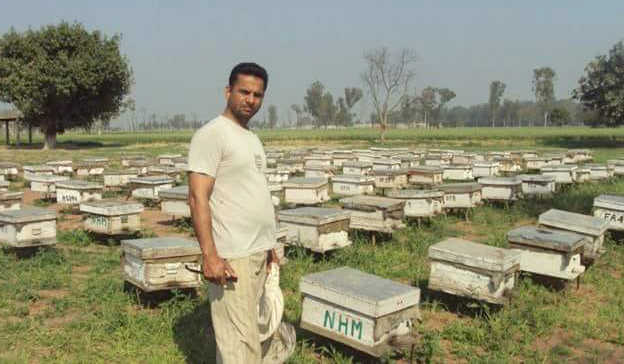Box: Many beekeepers has quit profession
“Owing to rampant adulteration of honey with different types of syrups (sugar and corn syrups), beekeepers in this part of the region are not getting remunerative prices for their genuine product (naturally produced honey in apiaries). And due to this setback, beekeeping has become a non-profitable enterprise and a large number of beekeepers have quit this profession.
Narpinder Singh, state president of the Progressive Beekeepers Association
Sameer Singh
Tribune News Service
Bathinda, September 23
Expressing concern over the adulteration of honey, beekeepers in the region have demanded regular testing and sampling of honey to discourage the malpractice. Beekeepers say that as the adulteration of honey continues unchecked, they are not getting remunerative prices for their natural honey produce.
Notably, the FSSAI has laid down fresh honey quality standard guidelines, which came into effect on January 1, to curb the adulteration of honey. The tests like SMR, TMR and oligosaccharides have been included in the quality standards to restrict mass adulteration of honey. The inclusion of these tests has created panic among the agencies who are involved in this malpractice.
Talking to Bathinda Tribune, Narpinder Singh, state president of the Progressive Beekeepers Association, said, “Owing to rampant adulteration of honey with different types of syrups (sugar and corn syrups), beekeepers in this part of the region are not getting remunerative prices for their genuine product (naturally produced honey in apiaries). And due to the setback, beekeeping has become a non-profitable enterprise and a large number of beekeepers have quit this noble profession and the number of beekeepers has also declined drastically in the past few years.”
Narpinder Singh further added, “Unscrupulous industrialists or traders have been creating hindrances in the implementation of new standards laid by FSSAI and want purity tests — SMR, TMR and oligosaccharides — to be withdrawn (from its quality assessment evaluations) citing that these tests are not useful in checking honey adulteration.”
Beekeepers in the region say that an independent and unbiased opinion of the National Bee Board on the matter would be a welcome move otherwise if these tests are withdrawn at the behest of big players in the business, then the future of beekeepers operating at the micro, small and medium scales would be in peril.
Jagtar Singh Kaler, a beekeeper from Sangrur, said, “After sustaining losses in the beekeeping business for the past four years, I had no alternative but to opt for a subsidiary business. So, I decided to open outlets of other organic products such as vegetables and fruits. I started the beekeeping business way back in 1999 and after earning a good income, even recommended it as a lucrative business proposition to others as well. But in the past five years, things have gone haywire after the implementation of GST coupled with excessive adulteration. Beekeepers have not been getting even the input cost by selling their produce. How are they supposed to sustain losses? Discouraging adulteration is the only way forward in bringing the ailing beekeeping industry back on track now.
Moreover, a long spell of rain has caused significant losses to beekeepers in the region. Beekeepers say that apart from denting their business prospects, adulteration is harmful for the health of consumers.
Jagtar Singh, Mandi Khurd, another beekeeper from Bathinda and executive member of the association, said they had submitted a representation to the Ministry of Commerce and Industry (Union Government) regarding the problem being faced by beekeepers in the state and requested them to ensure adequate measures to revive it at the earliest. A few beekeepers in the region have even been devising a new strategy to introduce their own local honey brands rather than selling it to bigger brands. Presenting a rosy picture of beekeeping business by the authorities would solely would not hold the industry.
Dr Amritpal Singh, District Health Officer, Bathinda and Mansa, said, “As I have taken the additional charge of Bathinda recently, I would not be able to comment on sampling being done here. But we had collected a few honey samples in Mansa and one of them had even failed the purity test. Now, we would conduct sampling of honey in shopping outlets and even at apiaries from where beekeepers have started packing and selling honey directly now.”
Unlock Exclusive Insights with The Tribune Premium
Take your experience further with Premium access.
Thought-provoking Opinions, Expert Analysis, In-depth Insights and other Member Only Benefits
Already a Member? Sign In Now










